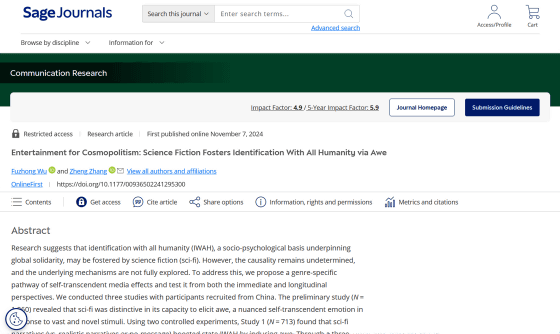Exposure to science fiction could help foster a 'sense of global solidarity'

Science fiction (SF) is a fictional work based on a scientific background, and the contents of past SF works
Entertainment for Cosmopolitism: Science Fiction Fosters Identification With All Humanity via Awe - Fuzhong Wu, Zheng Zhang, 2024
https://journals.sagepub.com/doi/10.1177/00936502241295300

Science fiction may help foster a sense of global solidarity by evoking awe, study finds
https://www.psypost.org/science-fiction-may-help-foster-a-sense-of-global-solidarity-by-evoking-awe-study-finds/
While past research has shown that certain types of stories can promote empathy or reduce prejudice, many of these studies have focused on specific storylines or emotions. So a research team from Soochow University and Tsinghua University in China investigated whether entire genres like science fiction influence people's social attitudes.
The research team particularly focused on the concept of 'identification with all humanity,' which refers to the degree to which a person feels connected to all people around the world, regardless of nationality, race, or background. 'Identification with all humanity' reflects an inclusive identity that involves concern for others around the world, and is associated with prosocial behaviors such as donating to international causes, supporting refugees, and caring for the environment.
In this study, the research team hypothesized that SF works, which often focus on imaginative worlds and a shared future for humanity, may encourage people to adopt a more global perspective. They conducted an experiment to verify this hypothesis.

The research team conducted three experiments. In the first experiment, 1,060 people were recruited from across China and asked to recall movies from one of 12 genres, including science fiction, romance, comedy, action-adventure, and documentary. They were then asked to rate the extent to which the movies they recalled evoked emotions such as awe, gratitude, compassion, admiration, and hope.
They found that science fiction was most strongly associated with awe compared to all other genres, and importantly, no similar pattern was found for other self-transcendent emotions, suggesting that increased awe was a response unique to science fiction.
In a second experiment, about 1,000 people were randomly assigned to read either a science fiction novel about a certain topic, a realistic novel about the same topic, or a non-narrative text about the same topic, and then measured their emotional reactions and how connected they felt to other people after reading.
The study found that people who read science fiction novels reported significantly stronger feelings of awe than other groups, as well as higher levels of 'identification with all of humanity.' Statistical analysis showed that the increased feelings of awe were linked to an enhanced sense of global awareness.

In a third experiment, the researchers followed 543 college students over a two-month period, asking them at various points throughout the study to report on their recent exposure to science fiction, how much awe they felt in their daily lives, and how strongly they identified with 'identification with all humanity.'
The results showed that greater engagement with science fiction increased everyday feelings of awe, and ultimately increased empathy for 'identification with all humanity.' In other words, the more immersed one is in science fiction, the more likely one is to experience awe in everyday life, which in turn led to the construction of a stronger global identity.
The experiment also found that subjects who already strongly identified with all of humanity were more likely to desire more sci-fi content in the following month, suggesting a feedback loop in which people who value global solidarity are drawn to media that reinforces this idea, thus further strengthening their identity.

Although the results were consistent across all experiments, all subjects were Chinese, who have strong collectivist values, so the results may differ in other cultural settings.
The research team emphasizes that science fiction is not the only genre that promotes 'identification with all humanity,' and genres such as drama and romance can also foster interest in the world through emotions such as compassion and love. However, psychology media PsyPost stated, 'SF, however, appears to foster 'identification with all humanity' in a unique way by expanding the mind and stimulating a sense of wonder about humanity's place in the universe.'
Related Posts:
in Science, Posted by log1h_ik







